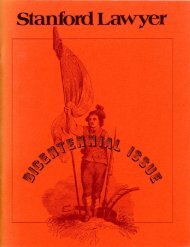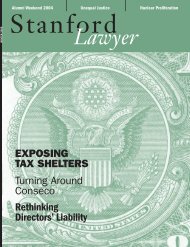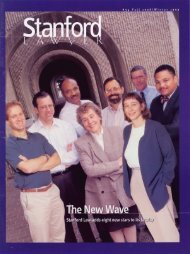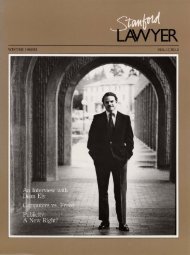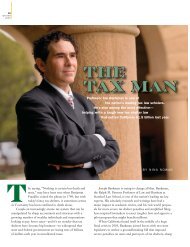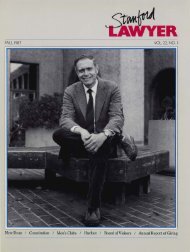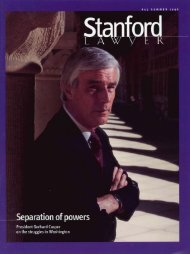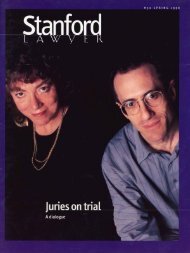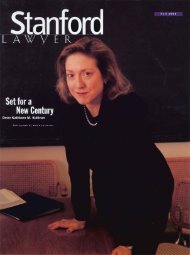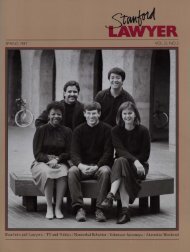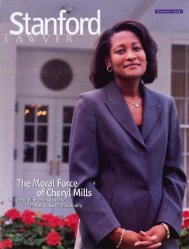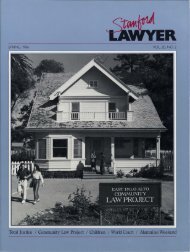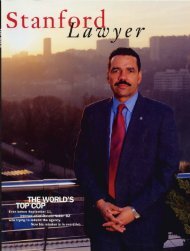~o~ Cff-VIMtu'0r-STATE OF THE SCHOOL continuedJ. Keith MannAssociate Dean, Academic AffairsDean MannRobert Paradise '29, TheodoreWeisman '31, and Professor HowardWilliams (holder ofthe new ParadiseChair in Natural Resources Law)Dean Mann reviewed the evolutionof the <strong>Stanford</strong> Law School curriculumfrom the late 1800s (the Harvardmodel), through the 1950s ("a realcurriculum taught by giants"), tothe innovations now being implemented."We have been laboring for somethingthat will be modern and thatwill prepare people not only for whatthey will be doing right out of lawschool but also twenty years later,"he said. Students should receive abalanced curricular experience thatimparts the necessary traditionalknowledge, cultivates the essentialtechnical lawyer's skills, and simultaneouslyfosters a capacity foradaptation to the changing worldin which they will live their professionallives.Dean Mann noted that even thosecourses that appear to have the samename as twenty years ago may differgreatly in content.In the past, he observed, the structureof education at most Americanlaw schools was fairly uniform. In recentyears, however, some schools,<strong>Stanford</strong> notably among them, havebegun to move in new directions."Times have changed, and issueshave changed," he said - "not to mentionstudents. The curriculum in allyears is being expanded, ways arebeing sought to familiarize studentswith the institutional arrangementsin which they are likely to work,more small group instruction isbeing provided, and students arebeing given more opportunity toeducate themselves."<strong>Stanford</strong> is, he said, in the forefrontof these developments. "Providingto all in the course of theirthree years a distinctively differentand progressively more advancedkind of academic or practical learningexperience remains a foremostbut elusive target."Dean Mann then outlined therevised first-year curriculum beingintroduced in <strong>1983</strong>/84. This curriculumis based on the traditional firstyearsequence but incorporatesimportant elements of the experimentalCurriculum B, which ranparallel to the standard CurriculumA for the past three years. The distinctionbetween Curriculum Bandthe rest of the first-year program willhave been eliminated. The revisedfirst-year course of study, he said,seeks to offer the new law student "abroad exposure to the variety that isthe law and the variety of ways inwhich differing minds approach it."All entering students, Dean Mannexplained, will now begin theautumn term with a four-day program,designed and tested in "B," "tointroduce them to the study of law."Topics covered include case analysis,legal institutions, and law andsociety or legal culture. "Studentsseemed to appreciate the establishmentof an introductory foundationfacilitating the transition into theregular class structure," he said.The rest of the term will be devotedto the basic first-year subjects-CivilProcedure, Contracts,Criminal Law, and Torts, as well aslegal research and writing.The spring term includes twomore required courses (ConstitutionalLaw and Property) and acontinuation of legal research andwriting. In addition, students willchoose two or three electives fromamong a varied menu of "perspective"courses: Law and Philosophy(Jurisprudence), Law in RadicallyDifferent Cultures, History ofAmerican Law, Economics for <strong>Lawyer</strong>s/ Finance Theory [see ((Law andBusiness" discussion below], Legislativeand Administrative Process,and <strong>Lawyer</strong>ing Process.<strong>Lawyer</strong>ing Process, Dean Mannexplained, is an innovative course,developed by Professor Paul Brestand several colleagues as part ofCurriculum B, which introducesstudents to "adversarial procedures,issues of professional responsibility,and alternative methods of settlingdisputes, such as arbitration."The development of the Economicsfor <strong>Lawyer</strong>s / Finance Theorycourse is regarded as an importantstep in creating a modern businesslaw curriculum.In sum, Dean Mann said, "the revisedfirst-year curriculum representsa highly promising blend of thetraditional with the new."32<strong>Stanford</strong> <strong>Lawyer</strong> <strong>Fall</strong> <strong>1983</strong>
Thomas F. McBrideAssociate Dean, AdministrationDean McBride, for whom this was afirst appearance before the Board ofVisitors, expressed his pleasure atcoming to <strong>Stanford</strong>.The School's financial situation, hereported, is very much affected bytrends both outside and within the<strong>University</strong>. These trends includeinflation (especially evident in utilitycosts), government financial aidpolicies, substantial tuition increases(the <strong>1983</strong>/84 Law School tuition is$9,178), and the financial resourcesof the <strong>University</strong>-which is experiencinga "real crunch" in recoveringactual direct and indirect costs fromresearch grants and contracts."The result," Dean McBride said,is that "we have to run to stay even."This year, the School was askedby <strong>University</strong> planners to pare itsbudget for fiscal 1984 by $120,000.This we did, McBride said, withminimal impact on program, by generatingsome new income throughsuch steps as increasing the applicationfee (from $35 to $40) and bymaking significant cuts in administrativeexpenses.Student aid needs are, Dean McBride said, another major concern.Since 1979, scholarship expenditureshave exhausted availablereserves. "We need to direct moredollars into financial aid, particularlyloans, recognizing that most of ourgraduates will have the futureearnings to comfortably afford loanrepayment," he observed."And we need to maintain theutmost flexibility in use of financialaid funds, making strategic allocationsbetween the relative levelsof scholarships and loan support."Dean Diaz and her staffare, he said,now examining the gift terms ofexisting School endowed and expendablefunds to see whether someportion might be appropriately redirectedto student aid, particularlystudent loan, purposes.The School is also stepping up itsefforts to collect delinquent loansfrom graduates. "Our overall delinquencyrate is about 5.2 percent,"Dean McBride noted. The central<strong>University</strong> administration has beenincreasingly aggressive in its collectionactions, and the Law School willalso be taking additional action.A third major area of activity forDean McBride has been the "computerization"of the Law School. "TheDickensian image of lawyers withink-stained fingers and yellow padsis simply not true here," he said."Both professors and administrativestaff are eager to employ the latesttechnologies."So far, IBM personal computershave been provided to faculty andsecretaries to meet basic wordprocessingneeds. And next year heanticipates substantial increases incomputer applications in the administrativefunctions of the LawSchool. Student access to computers,both for wordprocessing(term papers, etc.) and for actualclass assignments, is also planned.Two faculty members are presentlydeveloping computerized instructionalexercises.The ability to access research dataquickly will be increased next year,too, with the introduction of theWESTLAW legal research database. LEXIS is already availablein the Law Library. Dean McBrideexpects to see "improvements inwork-load patterns and productivity"in various areas of the School asa result of these technological advances.He concluded by saying that hispurpose, and that of the administrativestaff he supervises, is "to supportthe faculty and students in theessential educational enterprise."Dean McBride<strong>Fall</strong> <strong>1983</strong> <strong>Stanford</strong> <strong>Lawyer</strong>33
- Page 1 and 2: RFAll 1983VOL. 18, NO.1Heroin Optio
- Page 3 and 4: jah(e,oYCONTENTSSTANFORD lAWYEREdit
- Page 5 and 6: Business Law vs. Public Interest La
- Page 7 and 8: By John Kaplanjockson Eli ReynoldsP
- Page 9 and 10: maintenance almost entirely up toth
- Page 11: smaller percentage of British addic
- Page 14 and 15: that, because of regulation, cannot
- Page 16 and 17: of a whole variety of new mortgagei
- Page 18 and 19: ConversationsWith Five AlumniBy Mic
- Page 20 and 21: y landlords and tenants about rents
- Page 22 and 23: when I was studying law and she was
- Page 24 and 25: ~o(1)AtISSUE *Union 'Rights' in the
- Page 26 and 27: AtISSUECongressional Responses toSu
- Page 28 and 29: AtISSUEPrison Labor:TimeTo Take Ano
- Page 30 and 31: Graduates and friends of theSchool
- Page 32 and 33: ~o~ 4'-VVcYi~STATE OF THE SCHOOLJoh
- Page 36 and 37: ~o~ 4-(/141~STATE OF THE SCHOOL con
- Page 38 and 39: ~o~4VJ41~SUCCESSFUL LAWYERING:IMPLI
- Page 40 and 41: ~o~of-VJM~SUCCESSFUL LAWYERING cont
- Page 42 and 43: @.oarcA 4l!141~THE CONSTITUTION, RA
- Page 44 and 45: @o~4t1J41~.LAW AND BUSINESS PROGRAM
- Page 46 and 47: @otwrA 4vJ41~ .SUMMARY AND ADVISORY
- Page 48 and 49: David L. Engel(Harvard, JD '73)Bost
- Page 50 and 51: New Faculty (cont.)Michigan Law Sch
- Page 52 and 53: GILSON (cant.)Gilson is currently p
- Page 54 and 55: BabcockAwarded anHonorary LL.D.by S
- Page 56 and 57: CAREER 'ALTERNATIVES' (cant.)2. A s
- Page 58 and 59: Hurlbut WinnerTalks AboutTeachingPr
- Page 60 and 61: Schod;NI Grads Scatter toCities All
- Page 62 and 63: FACULTV NOTES (cant.) Professor Gun
- Page 64 and 65: it will be less so if we adopt a he
- Page 66 and 67: than on its edges, thus increasing
- Page 68 and 69: Heroin maintenance is, in manyways,
- Page 70 and 71: c~OTESII1912-25Hon. David Lee Rosen
- Page 72 and 73: c~NOTESthe firm advises, that "Donn
- Page 74 and 75: c~NOTESand had been prominent in a
- Page 76 and 77: spring Dean Ely traveledLEast, wher
- Page 78 and 79: 5Stanford LaWlers:This Page IsYours
- Page 80 and 81: October 11Washington, DC LawSociety
- Page 82 and 83: COMPARATIVE CONTRIBUTIONS TOTHE LAW
- Page 84 and 85:
A MESSAGE FROM THELAW FUND PRESIDEN
- Page 86 and 87:
CLASSAGENTSLong BeachSterling S. Cl
- Page 88 and 89:
Warren Christopher'49 Penny Howe Ga
- Page 90 and 91:
Frank L. Mallory '47Richard C. Mall
- Page 92 and 93:
Ronald G. Trayner '67Anthony J. Tre
- Page 94 and 95:
Walter A. Johnson, A.B. '29 Maxine
- Page 96 and 97:
DONORS TO THE LAW FUND• Hon. Murr
- Page 98 and 99:
CLASS OF 1948R. Winfield AchorHon.
- Page 100 and 101:
• Thomas R. MitchellR. Chandler M
- Page 102 and 103:
Paul E. Kreutz• Prof. Richard B.
- Page 104 and 105:
Gabriel M. GesmerMichael GilfixCorn
- Page 106 and 107:
HIGHEST LEVELSOF PARTICIPATIONLARGE
- Page 108 and 109:
FACULTY, FORMERFACULTY &STAFFBarbar
- Page 110 and 111:
REUNION GIVINGWhile class reunions
- Page 112 and 113:
DONORS TO SPECIALPROGRAMS AND FUNDS
- Page 114 and 115:
Class of 1954 Reunion Student Finan
- Page 116 and 117:
In Memory of:Clifton C. Cottrell '2
- Page 118 and 119:
Clyde E. Tritt'49William W. VaughnS
- Page 120:
BEQUESTS AND DEFERRED GIVINGBequest




